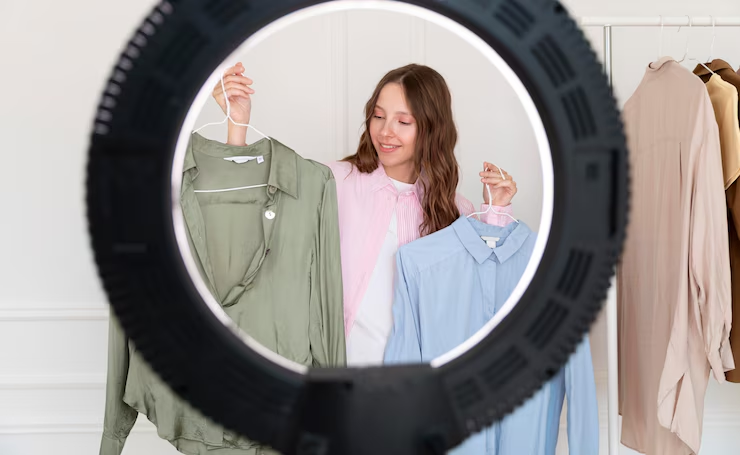Table of contents
Why Investing Wisely in Your Wardrobe Matters More Than Ever

In today’s fast-paced fashion world, it’s easy to be lured by sales, trends, and overflowing shopping carts. But more clothing doesn’t necessarily mean better style. In fact, learning the art of Shopping Smart—choosing quality over quantity—is the secret to building a wardrobe that’s timeless, functional, and eco-conscious.
This post explores how choosing quality garments can elevate your fashion game, save you money in the long run, and reduce your environmental impact. If you’re ready to shop with intention, you’re in the right place.
What Does “Shopping Smart” Mean?

Shopping Smart means making thoughtful, intentional purchases rather than impulsively buying whatever catches your eye. It’s about investing in pieces that serve your style, last longer, and align with your values. Instead of overstuffing your closet with trend-driven items, you’re creating a sustainable, high-quality wardrobe that you’ll actually wear and love.
Quality vs. Quantity: The Key Differences
| Aspect | Quality | Quantity |
|---|---|---|
| Cost | Higher upfront, but better long-term value | Lower cost per item, but adds up |
| Longevity | Lasts for years, resists wear and tear | Prone to damage, wears out quickly |
| Fit & Feel | Tailored, breathable, premium fabrics | Often generic fits, uncomfortable |
| Sustainability | Less waste, ethical production | Supports fast fashion, increases landfill |
| Style Impact | Looks polished and timeless | Can feel trendy but short-lived |
Benefits of Prioritizing Quality in Fashion
1. Timeless Style
High-quality pieces are often designed with timeless silhouettes and neutral tones that transcend seasonal fads. A tailored blazer, crisp white shirt, or leather boots never go out of style.
Tip: Look for classic cuts and colors when shopping for investment pieces.
2. Cost-Effective in the Long Run
While a high-quality jacket might cost more initially, it won’t need replacing every season like its cheaper counterparts. Over time, the cost-per-wear drops significantly.
Tip: Ask yourself: “Will I wear this at least 30 times?” before buying.
3. Better Fit and Comfort
Quality clothing is usually made from superior materials and better construction techniques, resulting in a better fit, feel, and overall confidence boost when worn.
Tip: Prioritize fit and fabric over flashy designs or impulse trends.
4. Eco-Friendly Wardrobe
Fast fashion is one of the biggest contributors to global pollution. Shopping smart supports ethical brands that use sustainable practices and durable materials.
Tip: Research brands before buying. Look for certifications like GOTS, Fair Trade, or OEKO-TEX.
5. Less Clutter, More Clarity
Having fewer but better clothes simplifies your daily routine. You’ll spend less time deciding what to wear and more time enjoying your personal style.
Tip: Build a capsule wardrobe with interchangeable, high-quality basics.
How to Start Shopping Smart
- Evaluate your current wardrobe: What pieces do you wear most? Which fall apart quickly?
- Set a monthly fashion budget: Invest in 1–2 higher-quality items instead of 10 cheaper ones.
- Learn to recognize quality: Check stitching, fabric type, lining, and hardware.
- Take care of your clothes: Wash less frequently, use proper hangers, and repair instead of toss.
- Buy secondhand designer: High-quality pieces are often available at resale or consignment stores.
Frequently Asked Questions (FAQs)
A: Not at all. Shopping smart is about long-term value, not price tags. Thrifting, shopping sales, or investing slowly in staples are all smart strategies.
A: Look for strong stitching, lined interiors, natural fabrics (like cotton, wool, silk), solid buttons/zippers, and overall craftsmanship.
A: Fast fashion is mass-produced, trend-driven, and often low quality. Quality fashion focuses on durability, ethical production, and timeless design.
A: Unfollow fast fashion brands, create a wishlist, and practice the “wait 48 hours” rule before making any purchase.
A: Yes, balance is key. Pairing trendier, lower-cost pieces with long-lasting basics helps you stay stylish without sacrificing quality or budget.
Final Thoughts
Shopping Smart is about more than just saving money—it’s about curating a wardrobe that makes you feel good, look polished, and supports a more sustainable world. By choosing quality over quantity, you’ll waste less, stress less, and express yourself with greater confidence and intention.
So next time you’re tempted by a “BOGO” sale, pause and ask: is this piece adding real value to my style?





